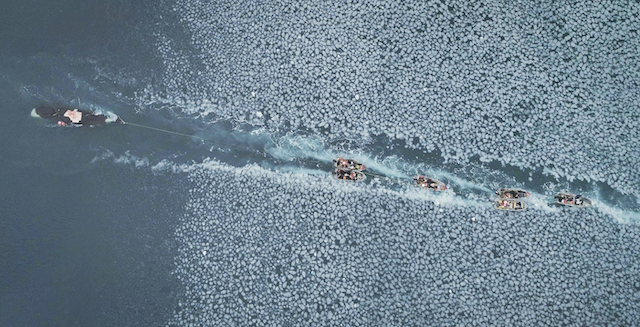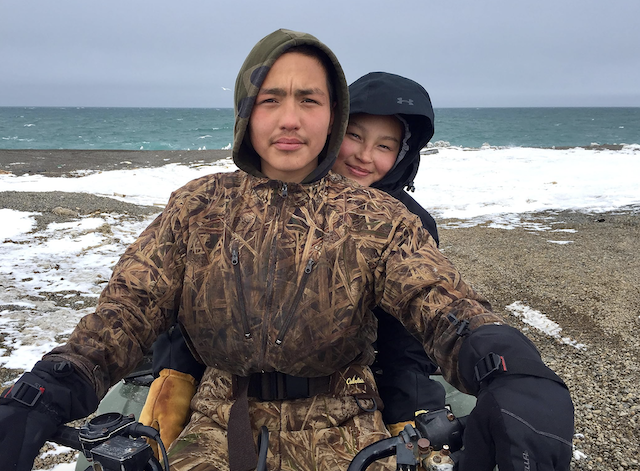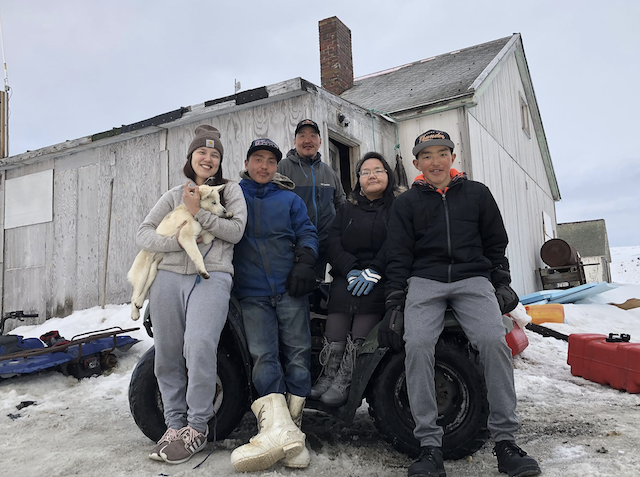
©Courtesy of ITVS
St. Lawrence Island is part of Alaska, but geographically, it is located closer to Russia. Many of the indigenous Yupik people have adopted Christianity and an American identity, but they still retain their traditional customs. By necessity, that also includes diet, notably including whale meat. Without successful whale hunts, the entire Yupik community could face starvation.
That is why they celebrated teenaged Chris Apassingok when he became the youngest Yupik hunter to harpoon a whale. Yet, much to their shock, many online trolls outside their community demonized the high school student, even flooding him with death threats. Filmmakers Peter Chelkowski and Jim Wickens introduce viewers to the Apassingok family, at a time when their way of life is threatened on several fronts in their documentary, “One with the Whale.” After several festival screenings, it airs this Tuesday on PBS, as part of the current season of “Independent Lens.”
It should be understood right from the start the Yupiks’ whale hunts are not illegal. They have a yearly quota from the International Whaling Commission that they scrupulously observe. That did not matter to environmental extremist Paul Watson (founder of Sea Shepherd), who incited his followers to post hateful comments on Apassingok’s social media accounts, even though the Yupik hunter was still a minor.

©Photo by Agra & Ina
This will sound familiar to the residents of the Japanese coastal village of Taiji. They have endured similar vitriol from protesters inspired by the film “The Cove” and enflamed by Sea Shepherd, as Keiko Yagi documented in “Behind ‘The Cove.’” “One with the Whale” captures a another nasty clash of cultures, but from the indigenous Alaskan perspective. Arguably, the situation is more precarious for the Yupik, who always live or die according to the hunt.
To put the matter in prospective, Chelkowski and Wickens explain Apassingok and his fellow high school students are all granted ten annual “subsistence” absences. That is expressively to accommodate their families’ need to hunt, fish, or gather wild produce to survive.
Poor Apassingok never looks very comfortable during the film. He is somewhat awkward expressing himself and deeply confused by the attacks. It is hard to think of a film, narrative or documentary, in which social media plays a positive role in society. “One with the Whale” is no exception.
The film clearly identifies Watson as the instigator of Apassingok’s trolls, but he never appears on-camera to address his conduct. Frankly, some viewers might be frustrated that Chelkowski and Wickens never confront any of the death threat posters. The film certainly addresses the controversy and its impact on Apassingok and his family in detail. Yet, there is also a greater ethnographic dimension to “One with the Whale” than “Behind ‘The Cove.'”

©Photo by Apassingok Family
In fact, they filmmakers devote considerable time to Apassingok’s closeted sister, who moves to Anchorage (“the big city”), where she feels more comfortable expressing her sexual orientation. Aesthetically, the co-directors-co-cinematographers are much more inclined towards quiet observation than point-counterpoint debate. This is an undeniably well-intentioned film, but the reserve of its participants inevitably affects the viewing experience.
In some ways, “A Whale of a Tale” is also part nature film, because it often discusses climate change, which the hunters blame for dwindling game (not just whales, but also seals and walruses). Yet, the subarctic landscape is often quite beautiful. Viewers truly get a sense of St. Lawrence’s isolation from the island’s ice and tundra.
“One with the Whale” certainly sways viewers sympathies in favor of Apassingok and his Yupik community. The filmmakers always respect their subjects, as you would expect, considering Apassingok’s mother, Aakapak Susan Apassingok, co-produced. Recommended for its sensitive depiction of the Yupik people and the issues it raises, “One with the Whale” airs Tuesday (4/23) on most PBS stations nationwide.
Grade: B
Check out more of Joe’s articles.
If you have your own thoughts, please share the comment!
Here’s the trailer of the film.

